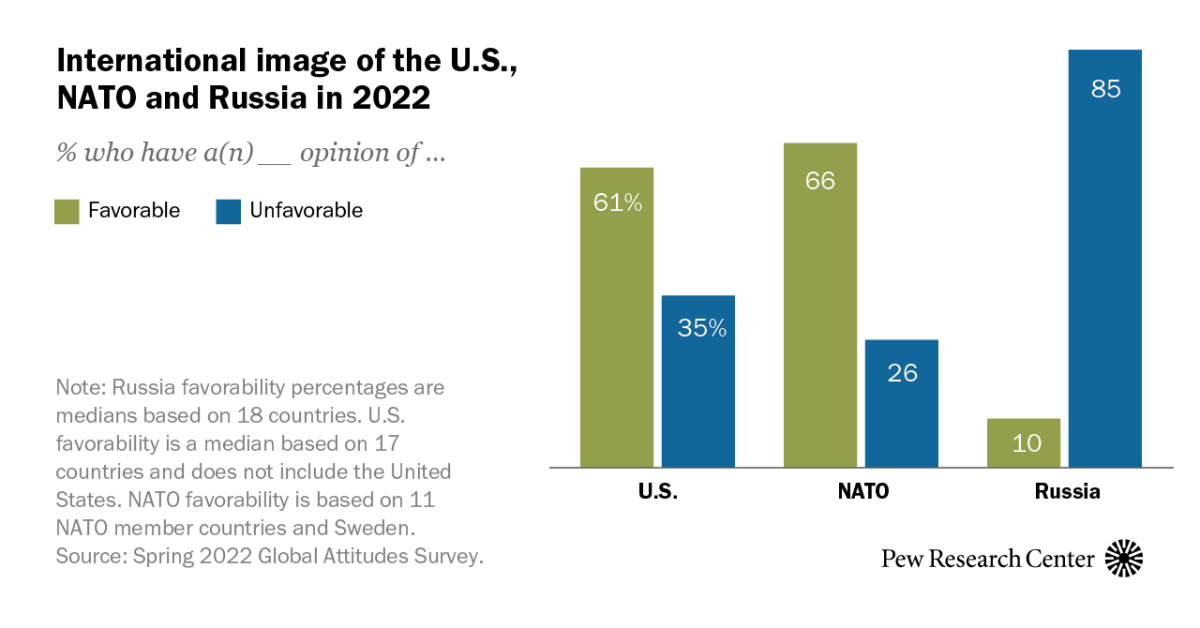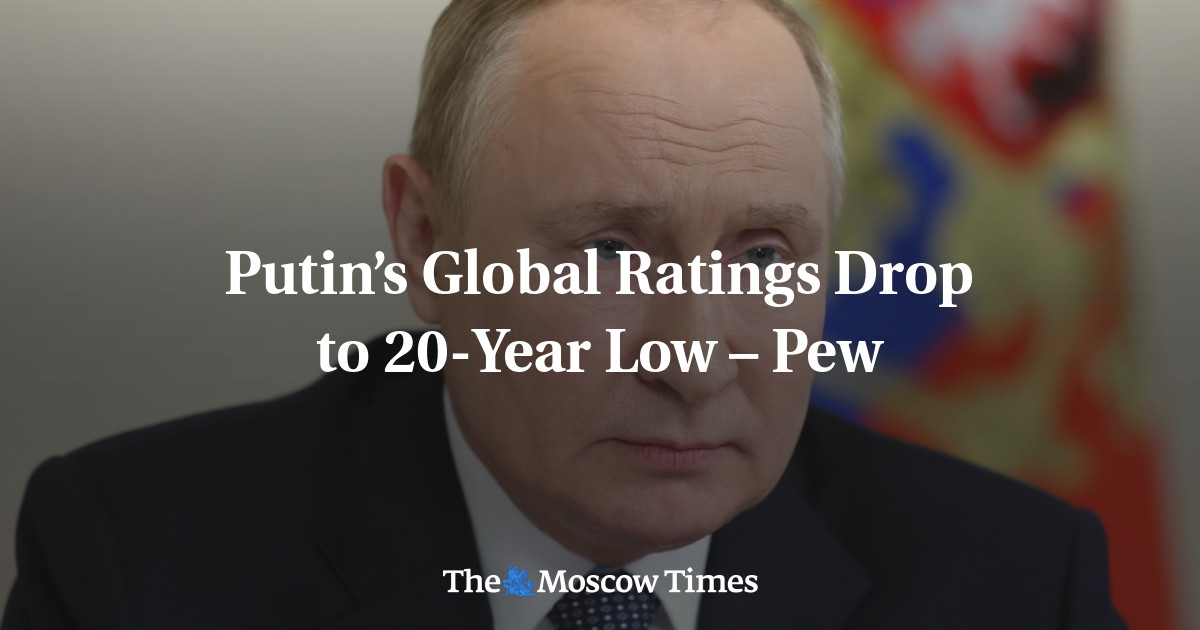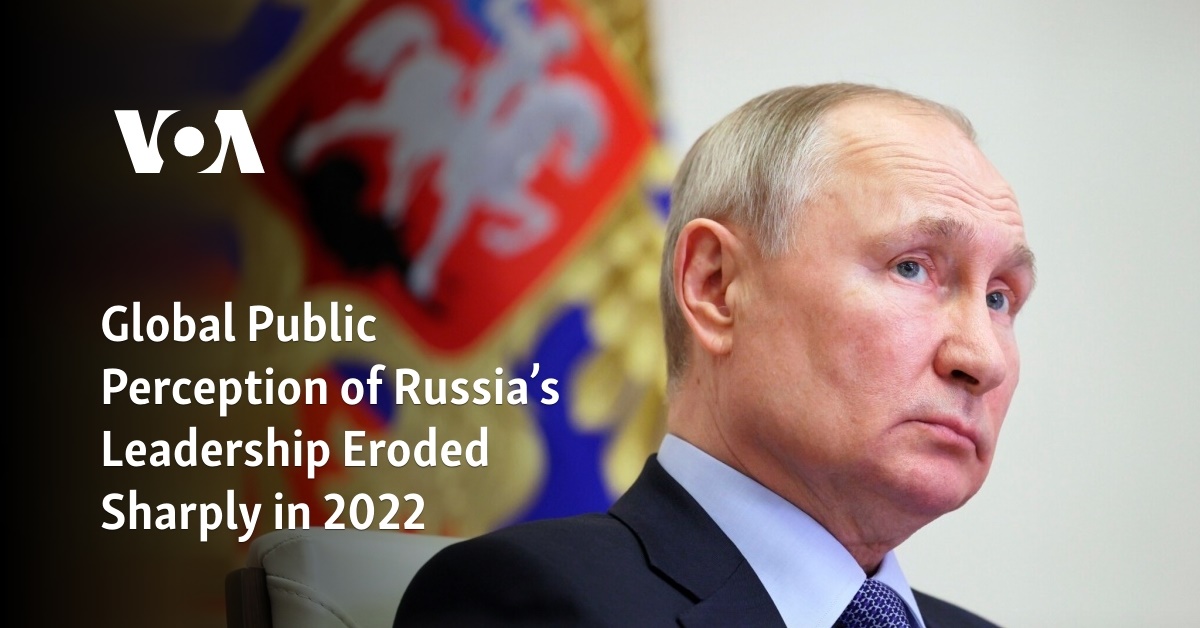The global ratings you linked from Pew is very biased. They only surveyed developed countries and a couple of Asian ones. So of course it was skewed against Putin. Oil&Gas is right about the majority of the world not being as unfavourable to Putin as you'd imagine.
With Zelensky invite, Saudi seeks star turn on world stage
One man is revered in Western capitals for standing up to Russia's full-scale invasion of his country.The other is widely reviled for atrocities committed against his own people in a war that has made him dependent on Moscow.At the Arab League summit on Friday, host Saudi Arabia brought...www.al-monitor.com
I could see, the Putin lovers are out tonight! OK, let's throw a little cold water on the Love Putin Party

Tempered in a Crucible of Violence, Zelensky Rises to the Moment (Published 2023)
In much of the world, President Volodymyr Zelensky, once brushed off as a political lightweight, has become a household name, representing Ukraine’s tenacity and underdog victories against Russia.www.nytimes.com

Zelensky has mastered the world stage and earned a place in history
Imagine, for a moment, what it is like to be Ukraine’s president Volodymyr Zelensky. Your primary and most basic official task is to stay alive, so comprehensively have you come to embody the fate and valour or your embattled people. Death is all around you: in the shells that rain down on the...www.standard.co.uk
vs
First, pre-illegal invasion

Image of Putin, Russia Suffers Internationally
People around the world broadly think Russia plays a more important role in international affairs than it did a decade ago. But increased stature does not mean being better liked.www.pewresearch.org

Publics Worldwide Unfavorable Toward Putin, Russia
Around the world, few people trust Putin to do the right thing when it comes to international affairs.www.pewresearch.org
let us continue to the present after this goofball dumbass twat decided to invade a sovereign friendly neighbor

3. Ratings for Russia drop to record lows
A median of 85% across 18 countries express an unfavorable opinion of Russia, with majorities in most nations saying they have a very unfavorable opinionwww.pewresearch.org

Putin’s Global Ratings Drop to 20-Year Low – Pew - The Moscow Times
Russian President Vladimir Putin’s global ratings have sunk to 20-year lows as the Russia invasion of Ukraines enters its fourth month, according to a Pew Research Center poll published Wednesday.www.themoscowtimes.com

Global Public Perception of Russia’s Leadership Eroded Sharply in 2022
A Gallup survey found that in every region of the world, public approval of Russia’s leadership plummeted in the wake of its invasion of Ukrainewww.voanews.com
Ukraine To Receive Military Support 'For As Long As It Takes'
- Thread starter oil&gas
- Start date
The world has a population of 8 billion. Easily no less than 6
billion of them read non-English news regularly. Vast majority
of these people are not Putin lovers. But they are not seeing
him as the Adolph Hitler of our time in war with Winston Churchill
that is Zelensky. I am not surprised if Zelensky's star is brighter than
Greta Thunberg's in India, China and Africa. But he cannot count on
more than a handful of countries outside NATO for meaningful
military and financial support. Zelensky surely has an infinitely
bigger chance to win the Nobel Peace prize than Putin. But the
bogus Nobel award is not a good measure of star power.
billion of them read non-English news regularly. Vast majority
of these people are not Putin lovers. But they are not seeing
him as the Adolph Hitler of our time in war with Winston Churchill
that is Zelensky. I am not surprised if Zelensky's star is brighter than
Greta Thunberg's in India, China and Africa. But he cannot count on
more than a handful of countries outside NATO for meaningful
military and financial support. Zelensky surely has an infinitely
bigger chance to win the Nobel Peace prize than Putin. But the
bogus Nobel award is not a good measure of star power.

With Zelensky invite, Saudi seeks star turn on world stage
One man is revered in Western capitals for standing up to Russia's full-scale invasion of his country.The other is widely reviled for atrocities committed against his own people in a war that has made him dependent on Moscow.At the Arab League summit on Friday, host Saudi Arabia brought...www.al-monitor.com
I could see, the Putin lovers are out tonight! OK, let's throw a little cold water on the Love Putin Party

Tempered in a Crucible of Violence, Zelensky Rises to the Moment (Published 2023)
In much of the world, President Volodymyr Zelensky, once brushed off as a political lightweight, has become a household name, representing Ukraine’s tenacity and underdog victories against Russia.www.nytimes.com

Zelensky has mastered the world stage and earned a place in history
Imagine, for a moment, what it is like to be Ukraine’s president Volodymyr Zelensky. Your primary and most basic official task is to stay alive, so comprehensively have you come to embody the fate and valour or your embattled people. Death is all around you: in the shells that rain down on the...www.standard.co.uk
vs
First, pre-illegal invasion

Image of Putin, Russia Suffers Internationally
People around the world broadly think Russia plays a more important role in international affairs than it did a decade ago. But increased stature does not mean being better liked.www.pewresearch.org

Publics Worldwide Unfavorable Toward Putin, Russia
Around the world, few people trust Putin to do the right thing when it comes to international affairs.www.pewresearch.org
let us continue to the present after this goofball dumbass twat decided to invade a sovereign friendly neighbor

3. Ratings for Russia drop to record lows
A median of 85% across 18 countries express an unfavorable opinion of Russia, with majorities in most nations saying they have a very unfavorable opinionwww.pewresearch.org

Putin’s Global Ratings Drop to 20-Year Low – Pew - The Moscow Times
Russian President Vladimir Putin’s global ratings have sunk to 20-year lows as the Russia invasion of Ukraines enters its fourth month, according to a Pew Research Center poll published Wednesday.www.themoscowtimes.com

Global Public Perception of Russia’s Leadership Eroded Sharply in 2022
A Gallup survey found that in every region of the world, public approval of Russia’s leadership plummeted in the wake of its invasion of Ukrainewww.voanews.com
The world has a population of 8 billion. Easily no less than 6
billion of them read non-English news regularly. Vast majority
of these people are not Putin lovers. But they are not seeing
him as the Adolph Hitler of our time in war with Winston Churchill
that is Zelensky. I am not surprised if Zelensky's star is brighter than
Greta Thunberg's in India, China and Africa. But he cannot count on
more than a handful of countries outside NATO for meaningful
military and financial support. Zelensky surely has an infinitely
bigger chance to win the Nobel Peace prize than Putin. But the
bogus Nobel award is not a good measure of star power.

But they don't hate on Zelensky, unlike the Putin trolls that infest this forum.The world has a population of 8 billion. Easily no less than 6
billion of them read non-English news regularly. Vast majority
of these people are not Putin lovers...
They don't hate Putin either.But they don't hate on Zelensky, unlike the Putin trolls that infest this forum.
I just finished listening to another in-depth analysis of the Wagner
rebellion aired somewhere in Central Asia. Most of these news analysts
outside the western world are way more insightful and objective than
pretty much everyone I've read about in our media and certainly more so
than any posters (me included) on TERB. No, they are neither Putin or
Zelensky haters which I have yet to find one. Nor are they associated
with the extreme left or right. They are just people capable of independent
thinking.
I won't get emotional if either Putin and Zelensky are taken out
tomorrow. I follow the war closely because forecast of how events
are unfolding is closely tied to my interest. Obviously I have my
bias and I am not pro-Ukraine. But I am open to a whole spectrum
of different outcomes of the war.
Last edited:
Prior to the illegal invasion perhaps but after I believe majority of the world except of course for the ones now gaining from weapon purchases and from cheap oil ( N. Korea, India, Iraq, China, South Africa) are not happy with the Pooptin.The global ratings you linked from Pew is very biased. They only surveyed developed countries and a couple of Asian ones. So of course it was skewed against Putin. Oil&Gas is right about the majority of the world not being as unfavourable to Putin as you'd imagine.
Thanks for your insight.I would second the original poster to which you responded. Atleast from an Indian standpoint, I can tell you most Indians morally support Ukraine just like we supported Iraq and Afghanistan, because it is wrong to invade another country. Indians also dont really care about Russia that much. To us it is a country that sells us weapons and oil. Don't believe some youtube comments from Indians praising Russia. Within the country no one even thinks or talks about them.
But for all other cases most of us dont even think about Ukraine or Russia because it is a distant war between two different countries with whom we dont share any cultural or personal ties. I am sure the majority dont even know why this war is being fought. This is the case with the majority of nations in the middle east, Africa and Asia and may be some in Latin America. Morally anyone can agree that Russia is wrong, but politically they dont think much of either country, especially their leaders. The reporting in those countries therefore tends to be more matter of fact. Atleast to the extent I have seen.
As you point out, and in doing so shoot down troll&gas' argument, very few of the 8 billion people in the world and likely much fewer of the 6 billion '2nd-3rd world' people even care about this war to even know anything about it, nor have any opinion of who they support.
This is why the opinions and participation of those who have the luxury of having the time and resources to understand and care about these things are so influential.
Again, thanks for your insight.
The global ratings you linked from Pew is very biased. They only surveyed developed countries and a couple of Asian ones. So of course it was skewed against Putin. Oil&Gas is right about the majority of the world not being as unfavourable to Putin as you'd imagine.
Have you taken into account the reality that the overwhelming segment of the populations of those less developed countries have little primary education, least of all European history, little or no access nor exposure to global news and politics, and therefore absolutely zero interest, knowledge or opinions on Russia and/or Ukraine?
So trying to mitigate the overwhelming opposition to a maniacal war criminal by trying to impute that billions of people who exist in primitive, abject poverty, without access to or interest in global politics by saying "Not being as unfavourable to Putin as you'd imagine." is little more than hopeful projection.
Looks like the Democratic opinion is holding steady since 2019 while the Republican one has been declining.Americans, and especially Republicans, increasingly say the U.S. should focus on issues at home, while Democrats say it’s best for U.S. to be active in world affairs.
The reality is Zelenskyy has become a star and an example of a true leader.
In fact he was a clown/comedian.They consider him a clown.

Volodymyr Zelenskyy - Wikipedia
 en.wikipedia.org
en.wikipedia.org
Volodymyr Oleksandrovych Zelenskyy[a] (also transliterated as Zelensky or Zelenskiy;https://en.wikipedia.org/wiki/Volodymyr_Zelenskyy#cite_note-5 born 25 January 1978) is a Ukrainian politician and former comedian and actor who is the sixth and current president of Ukraine since 2019.
Born to a Ukrainian Jewish family, Zelenskyy grew up as a native Russian speaker in Kryvyi Rih, a major city of Dnipropetrovsk Oblast in central Ukraine. Prior to his acting career, he obtained a degree in law from the Kyiv National Economic University. He then pursued a career in comedy and created the production company Kvartal 95, which produced films, cartoons, and TV shows including the TV series Servant of the People, in which Zelenskyy played a fictional Ukrainian president.
The reason Zelenskyy was elected president of Ukraine was that the people did not want the to re-elect Petro Poroshenko who was corrupt and was a puppet of Russia, or at least he acted in his own best interest by favoring Russia.
He was elected president in a country run by a democratic government. Is thatThe reason Zelenskyy was elected president of Ukraine was that the people did not want the to re-elect Petro Poroshenko who was corrupt and was a puppet of Russia, or at least he acted in his own best interest by favoring Russia.[/b]
anything extraordinary?
Absolutely, he was an entertainer but now has transformed into a heroic leader fighting a tyrant who is a master at feeding his people misinformation.In fact he was a clown/comedian.

Volodymyr Zelenskyy - Wikipedia
en.wikipedia.org
Volodymyr Oleksandrovych Zelenskyy[a] (also transliterated as Zelensky or Zelenskiy;https://en.wikipedia.org/wiki/Volodymyr_Zelenskyy#cite_note-5 born 25 January 1978) is a Ukrainian politician and former comedian and actor who is the sixth and current president of Ukraine since 2019.
Born to a Ukrainian Jewish family, Zelenskyy grew up as a native Russian speaker in Kryvyi Rih, a major city of Dnipropetrovsk Oblast in central Ukraine. Prior to his acting career, he obtained a degree in law from the Kyiv National Economic University. He then pursued a career in comedy and created the production company Kvartal 95, which produced films, cartoons, and TV shows including the TV series Servant of the People, in which Zelenskyy played a fictional Ukrainian president.
The reason Zelenskyy was elected president of Ukraine was that the people did not want the to re-elect Petro Poroshenko who was corrupt and was a puppet of Russia, or at least he acted in his own best interest by favoring Russia.
........................so if Canada was attacked and had to war with an aggressor. Trudeau Oh,oh. would be a hero?
War tends to do that. It all depends on how he reacts. If he goes on and on about how we should understand the motives of our attackers, which he has done and probably would do, no.........................so if Canada was attacked and had to war with an aggressor. Trudeau Oh,oh. would be a hero?
You can face plant as a leader, but the bar is pretty low.
Also the term hero is way over used. You get cancer and not die, hero, you get cancer and die, hero, you stub your toe, hero.
However Zelnsks has doen alright, he gives suitable speeches, stayed in Kiev when he didn't have to, visited near the front. Nobody should be expecting him to visit the front with a warhammer and charging the enemies trenches.
You don't need a hero to be a war leader, unless you are turely fucked and it's over in which case it's meaningless. At least not at the national level. Ike didn't go charging machine gun posts, but he did all right in a very complex task.
Trudeau would very likely be a hero to us Canadians and to our
southern neighbours as well if they were not the invaders.
Winston Churchill was greatly admired and respected by a large
part of the world. But he was fighting a world war against all odds
not fighting in a regional conflict.
southern neighbours as well if they were not the invaders.
Winston Churchill was greatly admired and respected by a large
part of the world. But he was fighting a world war against all odds
not fighting in a regional conflict.
And Churchill's political history is very strange.Winston Churchill was greatly admired and respected by a large
part of the world.
He stood for election in federal politics for the following parties, in order: Conservative (moderate right) Liberal (moderate left), National Liberal (a breakaway party from Liberal that lasted one year), Liberal, Constitutionalist (essentially "independent"), Unionist (a former breakaway of the Liberal party that had now aligned itself with the Conservative party and was a de facto Moderate Right party by then), and back to Conservative.
Seems he was a very indecisive guy, politically speaking. He stood for election to PM 3 times, '45, '50, and '51, and only won in 1951. His time in office from '40-'45 was by appointment by the Regent; he didn't actually win an election. Interestingly enough, the person who he replaced, Neville Chamberlain, also didn't win an election. And frankly, it's a wild ride!
The last person to win an election before WWII was Stanley Baldwin in 1935 with a big Conservative win. He ran on appeasement but rearmament, and praised their Democratic system for having elections instead of just appointing a dictator. He stepped down in '37 and Neville Chamberlain was appointment. He considered calling a general election but decided to serve out the term until 1940. He also was a big fan of appeasement, which is why in his big cabinet shuffle he reappointed the Earl of Halifax, mastermind of the appeasement strategy, to be Secretary of State for Foreign Affairs. It's worth noting Halifax met with many Nazi officials and heaped praise on them. Seems he was a racist antisemite himself.
Interestingly enough, Churchill was a backbencher at the time of the shuffle but was catapulted to Lord of the Admiralty. I'll also point out that Churchill was hardly a Saint himself, advocating against independence for the colonies, in particular the Indian colony because he believed Whites, particularly English Whites, were superior. Yup, Churchill was a monumental racism, to the extent that he has been called "the perfect embodiment of white supremacy". In 1955 he even got behind the "keep England white" movement. But I digress.
Chamberlain was actually very unimpressed with Churchill. As Lord of the Admiralty, they had meetings every day, sometimes multiple a day, and yet Churchill was still constantly sending him lengthy memorandums that Chamberlain was convinced were only being written to form the framework of some later book by Churchill, which turned out to be complete true. It was actually Churchill that was behind the disastrous Norway Campaign 2 years later that brought down Chamberlain's government and forced him to resign.
Most of the Conservatives wanted Halifax to succeed, but many parties said they wouldn't work with him (given that he was so sympathetic to Nazis, had praised Nazis, and they were at war with Nazis). Chamberlain didn't want to make the decision, so he held a meeting with both of them (the Nazi and the white supremacist) and told them Halifax was the Conservative frontrunner but Churchill was preferred by the other parties. He asked them their input. Both Churchill and Halifax have claimed that after a long silence, Halifax said it would be impossible for him lead the UK in a war because of his position in the House of Lords. Basically he said a commoner needed to do it, not a member of British Peerage, and so Churchill got he job.
Under Churchill, an Act of Parliament was passed, and given Royal Assent, to postpone the next general election until after the war, and at that point he was soundly defeated.
And that's the story of how English Nazi sympathizers, who praised how great they were for continuing to have elections, almost put the British government in the hands of a Nazi, but instead gave it to a white supremacist, who immediately suspended elections and took full control of the military and is seen as the best political leader of the war and a hero. Like I said, a wild ride!
Last edited:
In the event of a war, Trudeau better step down. He would be disastrous as a wartime leader. Even more disastrous than he is now. And PP better not step in, he'd be worse. Leslie, ideally, or Hillier would be our best options, I think.Trudeau would very likely be a hero to us Canadians and to our
southern neighbours as well if they were not the invaders.
That's an understatement....Obviously I have my bias and I am not pro-Ukraine...
It's a step forward though to admit your irrational bias against a country defending itself.
I am more rational than you think. If I can put my pocket book intoThat's an understatement.
It's a step forward though to admit your irrational bias against a country defending itself.
profits earned from selling NATO-supplied arms for Ukraine to
smugglers in Romania I'll be happy to become a part of Zelensky's
fanboydumb on TERB cheering the war on Ukraine's side to no end.
Wow, so fuck them , we should give them nothing so because of arms manufactures making money or your theory of smugglers from Romania making a pay day?I am more rational than you think. If I can put my pocket book into
profits earned from selling NATO-supplied arms for Ukraine to
smugglers in Romania I'll be happy to become a part of Zelensky's
fanboydumb on TERB cheering the war on Ukraine's side to no end.
Are the Tates behind the Romanian arm smuggling ring??? You know what, THEY ARE!!! I know they are because I just posted it!!






